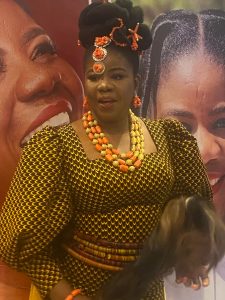Ikpendu believes that African natural hair represents the youthfulness and beauty of a woman, symbolising her strength to the world.
The hair enthusiast stated this during a round table event over the weekend in Abuja.
The event focused on appreciating the beauty of African hair was also used to unveil a book titled “My Afro-Kinky Hair; My Root and Heritage,” to promote the magnificence of Afro-hair.
According to her, the book emphasises how embracing our African natural hair can enhance our beauty, boost our confidence, and showcase our unique identity.
Moreover, Ikpendu explained that celebrating our Afro hair is not just about aesthetics but is a way to reconnect with our heritage, adding that it allows us to celebrate our African hair, skin colour, fashion, commitments, strength, passion, resilience, culture, and the undeniable beauty that is inherent in our own kind.
She added that this celebration ultimately serves as a reminder of our roots and connection to African heritage, noting that the unique texture of African hair can be considered genetic, as it is rare among other ethnic groups and prevalent only among Africans. It is a precious trait that has been passed down from one generation to another, tying us to our ancestry and making it an integral part of our identity.
She said, “I have consistently for the past six years worn my natural hair. I am excited about it because it connects me to my root.
“It has also helped me to identify where I am coming from, which is my heritage.
“As a young girl, I had watched my parents show up boldly in their African hair. So, I decided to go back to my African hair after decades of wearing texturised hair.”
The convener further said that African hair (afro hair) was beautiful and could go in any form, adding that it was not expensive because it was a gift
“When you wear African hair, there are the handiest products within your reach that you can use conveniently and beautifully to manage your African hair.

“Part of my dream on African hair is to encourage African women to show up in their identity.
“I want them to be confident in who they are; the colonial era tried to sell to us who we are not, resulting in identity situations and crises.
“The reason why I want to reach out to women is because I have seen young and older women embrace their identity in the way I showed up,” she added.
She went on to say that moisturising hair with simple clear water, spraying the water on your hair and comb, goes a long way in making your natural hair beautiful.
Ikpendu further explained that encouraging the local manufacturers of healthy organic beauty products was not a bad idea, as long as they used the right formulation.
“There are a lot of hair vendors with their different formulations. My advice is that their formulation should not inconvenience people’s hair.
”Maintaining your African hair is not costly because simple palm kernel oil, as well as simple baby shampoo, can take you far in the journey of moisturising your hair. You do not need any chemicals,” she added.
Speaking also at the event, the Book Reviewer, Dr Adebayo Okeowo, took the opportunity to express his admiration for the convener’s inspiring journey of embracing her own identity through her hair. He acknowledged that in the past, this act was often discouraged and looked down upon.
Dr Okeowo further highlighted that hair plays a significant role in identifying individuals in various countries across the globe. Unfortunately, it is also a sad reality that people often face discrimination based on the type of hair they choose to wear.
He said, “For the convener to come up with such an initiative that will inspire women on the need to wear African hair as well as promoting our African hair positively, it is a great development”.
Also speaking, the spouse of the convener Jasper Ikpendu, took a moment to express his gratitude towards his wife for venturing into a less common territory with the intention of reshaping the prevailing narrative.
Ikpendu emphasised the significance of the convener’s Afro-Kinky hair journey in bringing about a positive transformation in societal perceptions.
“Jacquelyn has broken the genre by making people know that you can have your own personal brand, as well as being a brand to yourself.
“She has made us know that you can create your own identity and make your identity sell beyond your centre of influence,” he said.




